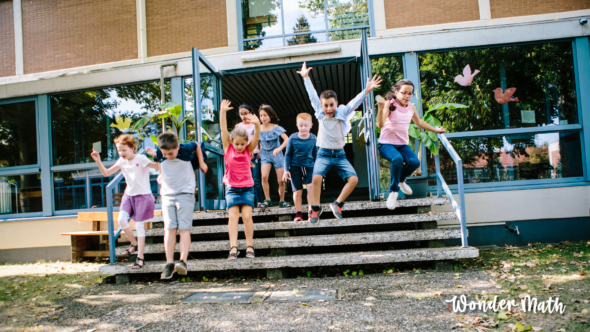What if there were a way to improve your child’s math abilities just by the way you praise them?
As parents, the words we give to our children about themselves and their performance can be deeply influential in helping them develop a healthy mindset about their learning.
So what does a healthy mindset about learning look like and how do we foster it in our children?
Dr Carol Dweck, a professor of psychology at Stanford University and author of the book Mindset: The New Psychology of Success, provided some answers when she began studying “fixed mindsets” vs. “growth mindsets” in children (Dwek, 2006). She found that kids who were nurtured to develop a “growth mindset” or a belief that with consistent effort and persistence, they could learn anything they want to, quickly performed far better than their peers with a fixed mindset.
Kids with a fixed mindset seem to focus on what they are “naturally” good at, their “talents” and “gifts.” They may be hesitant to try a new activity or persistently tackle a new challenge because they don’t want to underperform. They give up sooner in the face of challenges (i.e. learning a new skill like playing an instrument) because they believe that they lack the talent to do something. These fixed mindsets develop so easily in our world today that focuses on praising output or performance over process.
The kids with a growth mindset can recognize that they (and others) are not “smart” or “dumb” and that with hard-work and time, any new skill can be learned by them or anyone else. These kids have learned that even though success seems far off, with perseverance, effort, and a willingness to fail and try again, they can eventually succeed and excel. (Ricci & Lee, 2016).
Dwek’s research had two groups of 7th graders take a difficult math test. Average scores were around 58%. She took these students and told one group how smart they were. She praised them on their “talent.” They took the test a second time and scored an average of 53%.
The second group of students were praised on their effort, their hard work, and their process for studying. When this group retook the test, their success soared to a 70% average score.
“We found that students’ mindsets—how they perceive their abilities—played a key role in their motivation and achievement, and we found that if we changed students’ mindsets, we could boost their achievement.” – Dwek (Understood.org)
Dwek found that students’ beliefs about their intelligence and capabilities had an astounding impact on their school achievement, confidence, and happiness.
Academic performance isn’t always about smarts or talent. So much of it has to do with confidence, effort, and mindset. The good news is: You can improve your capabilities and “get good” at most things! Now, this doesn’t mean you will be in the top 1% but you can massively improve your abilities by embracing a growth mindset. Mindsets, especially in children, can be rapidly adjusted. As parents, you have a huge amount of influence on your child’s mindset and approach to learning.
Here are 6 ways you can help maximize your child’s learning potential and build their confidence by encouraging a growth mindset in your home:
- Praise the process and the effort – NOT their natural abilities: One key strategy to foster a growth mindset at home is to be intentional about how you offer praise. Dwek found that praising the process was the most powerful way to empower a child to be in control of their learning.“Many of the things we do to motivate our kids are sapping their desire to learn. Ability-praise backfires. Emphasising effort gives a child a variable that they can control. They come to see themselves as in control of their success.” – DwekJake Neuberg, co-founder of Wonderland Math gave this example: If your child comes home with straight A’s, you praise the effort they put in, the homework systems they developed throughout the semester, or the commitment to finishing a hard class, rather than praising them for “being smart.”
The what and how of parental praise is a huge part of optimizing success. We only get better through frequent challenges. Help them see the struggle as an essential part of the path to success. - Be mindful of labels you use to describe your child (even positive ones): As parents, we label our children much more frequently than we realize. As we are introducing them we may share what they are good at or big achievements they’ve made recently. The problem with this is that labels become part of a child’s identity. Being “good” at something increases the pressure to continue being “good” and makes failure much scarier, and taking risks much more…well, risky. If you say they are good at math but then they get a “bad” grade, their confidence can be damaged and they may limit themselves from taking risks in the future.The human brain can be weird. It’s super skilled at interpreting the inverse of a positive label and taking on an unspoken negative one. “Another A. You are so good at math!” can cause the thought “but I’m just bad at English…” so why try? As we try and label character attributes like bravery, resilience, persistence, and hard work, rather than the outcomes, we can do wonders for developing their confidence and growth mindsets.
- Model safe failure and persistent effort: So much of parenting happens silently through our examples. You can model a growth mindset for kids by showing them that you also make mistakes. Talk them through when and how you handle making mistakes, and why you keep trying. This helps them learn what to do when faced with their own challenges or difficult setbacks. You can use the phrase “I’m still learning” to help them understand that even as adults, we are never “done” learning and being challenged. For extra emphasis, you can pick out their favorite athletes or role models and point out the obstacles they had to work hard to overcome. There is always failure on the way to success.
- Teach your child that their brain is a muscle and can be strengthened. Bring a little anatomy lesson into your home! One great way to support growth mindset development is talking to your children about the brain. The brain is constantly making new pathways daily! Teach them about brain elasticity, new neuron pathways, and how the brain processes and stores mistakes to help us overcome the challenge in the future. Not sure where to start? A picture book like this or this may help!
- Catch them working hard/struggling and offer praise for their commitment and resilience. The next time you find your child sighing in frustration or on the verge of giving up, praise them for their hard work! Catching them in the moment of struggle and offering sincere praise is one of the best ways you can motivate them to continue pushing through and reinforce the big picture progress.
- Learn the power of the word “YET”: Say these out loud and listen to the difference.
“I can’t solve these problems. They are too hard for me.”
“I don’t know how to solve these problems yet, but I’m working on it.”
The addition of the word “yet” changes the feeling from discouraged to motivating. Teaching our kids how to habitually use and think the word YET, trains them to think about their achievement gaps as temporary. It primes them to continue learning and reinforces the idea that success is within their reach.
Your child’s skills in all areas of life and learning can increase far more than you (or they) realize when you can teach them to work hard, be excited about the process of learning, and embrace challenge as a step toward success.




